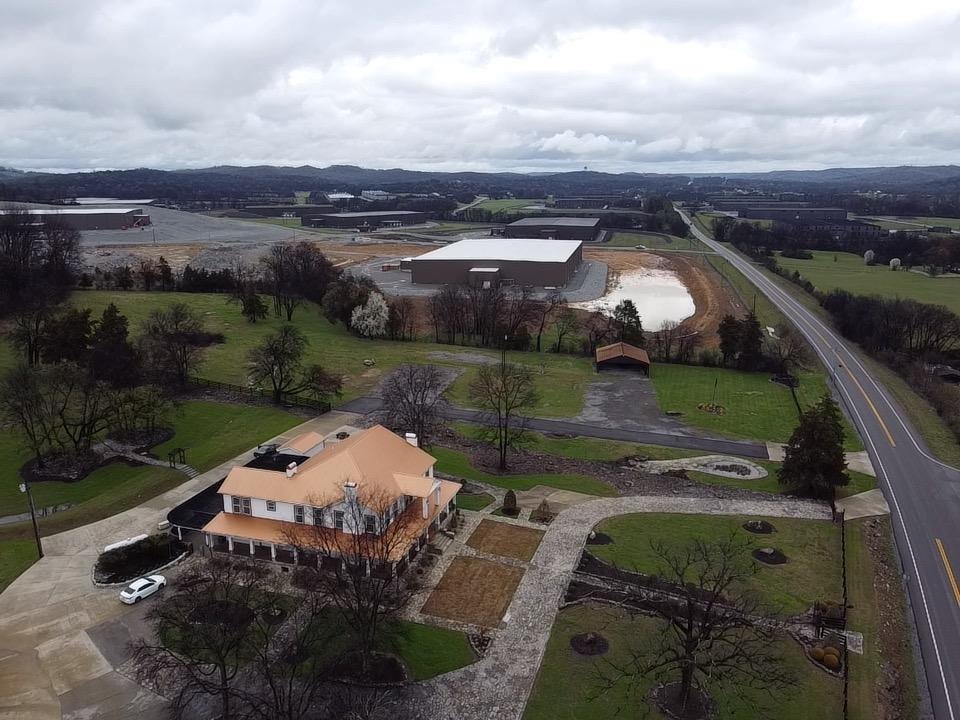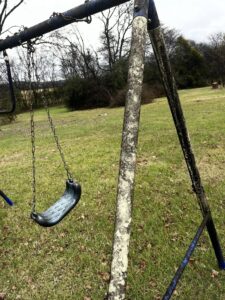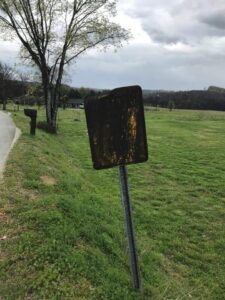
Two hours south of Nashville, black mold is spreading.
Playground swings look gunky.
Road signs are unreadable.
Trees are dying.
This is the scene unfolding in Mulberry, a small town in Lincoln County that borders the sprawling Jack Daniel’s whiskey operation — the food source for an alcohol-loving mold dubbed “whiskey fungus.”
Residents are fighting this fungal spread in court, as people begin to fear for their property value, plant life and personal health and wellbeing.
What is whiskey fungus?
As far back as 1100 BCE, people have been making alcohol by distillation.
Alcoholic spirits like whiskey are created by fermentation, the process of decomposing organic materials containing carbohydrates, and distillation, the process of increasing the concentration of ethyl alcohol in the fermented mixture.
When that alcohol is processed in barrelhouses, some of that alcohol evaporates. These ethyl alcohol, or ethanol, emissions can then combine with moisture in the air and create “whiskey fungus,” scientifically named Baudoinia compniacensis.
This fungus is a black mold but should not be confused with the dangerous variety commonly found in moist homes. It can attach to most structures, including trees, cars and homes, and it’s been around for a long time.
Shortly after the American Revolutionary War, and a whiskey tax in 1791, agents tracked down moonshiners — people who created whiskey illegally — by searching for this fungus.
“They would walk through the woods, look up in the trees for the presence of this fungus, and then they knew that there were stills that were nearby,” said Jason Holleman, the attorney who has been representing Lincoln County residents in court.
Why is the fungus spreading now?
Alcohol consumption rose significantly during the COVID-19 pandemic, with alcohol sales increasing by about 3% from 2019 to 2020.
The Jack Daniel’s operation in Tennessee has been steadily increasing for the past decade, with record sales in 2021. The more alcohol that’s produced, Holleman said, the more alcohol vapors are in the air.
“What you’re seeing is a lot more intensity in the ethyl alcohol that’s being put into the atmosphere around the facility,” Holleman said.
Jack Daniel’s was founded in Moore County in 1866. The company has been expanding recently, with six new barrelhouses in neighboring Lincoln County and plans for another 23 facilities, according to an email between the Tennessee Department of Environment and Conservation and the Environmental Protection Agency.
 Courtesy Patrick Long
Courtesy Patrick Long “Whiskey fungus” covers a swing set in Mulberry, Tenn.
There is a seventh facility that was under construction in Lincoln County. In February, a court ordered Jack Daniel’s to stop construction on the new building until the company obtained approval from the local planning commission and the appropriate permits.
Last week, at a hearing, a court ordered that no additional barrels of whiskey could be placed in the facilities in Lincoln County until the company got the needed approvals and permits, such as a use and occupancy permit, for the other facilities — which Holleman said could influence regulatory enforcement.
“Right now, we don’t have basic building inspections to be sure that these buildings are safe,” Holleman said.
There will be another hearing in June. If the approvals and permits have not been obtained by that time, the residents want the barrels in storage at some of the facilities to be removed.
Can whiskey fungus harm humans?
Whiskey is stored in barrelhouses, which can each hold anywhere from 6,000 to 67,000 barrels of whiskey, according to Jack Daniel’s.
In Vermont, the state environmental agency considers air permits for any warehouse that has the ability to hold more than about 1,500 barrels. Jack Daniel’s has two air quality permits with the Tennessee Department of Environment and Conservation, which did not respond to questions about the permits at the time of this publication.
It is difficult to determine the health impacts of whiskey fungus, because there have been no clinical studies — and few scientific studies — on the organism.
The Indiana State Department of Health says there are no known health hazards but recommends that people removing the fungus from surfaces should use N95 masks, goggles and gloves during removal.
 Courtesy Patrick Long
Courtesy Patrick Long “Whiskey fungus” covers a road sign in Lincoln County, Tenn.
Air samples taken from around distillery facilities “don’t often contain cells of the whiskey fungus,” Vanderbilt University professor and fungi researcher Antonis Rokas said in an email, suggesting the spores might not stay airborne for long.
Ethanol, on the other hand, is a volatile organic compound and a key ingredient of ozone pollution, also called smog. Ozone pollution can cause respiratory issues like damaged airways and aggravated asthma and chronic bronchitis. Low levels of ozone can cause health effects, according to the Environmental Protection Agency.
The closest state ozone monitor to Lincoln and Moore counties is located about 55 miles away in the city of Columbia.
The Jack Daniel’s facility in Moore County is the single largest polluter of volatile organic compounds in the state, according to the latest data from the Environmental Protection Agency. One property produced more than 9,000 tons of VOCs in 2017, and a second property emitted about 742 tons.
In addition to physiological health risks, some residents have expressed concerns that the visual blight is affecting their mental health.
“As a rural farm owner, I have a deep-seated desire to be a good steward of the land,” wrote Pamela Butler, a Mulberry resident, in a letter addressed to Lincoln County officials that was provided to WPLN News. “My stewardship and pride as a property owner in Lincoln County has been diminished.”
‘We’re watching trees die in slow motion’
Patrick Long and his wife, Christi Long, own an event venue in Mulberry. They bought the eight-acre property with a mansion for the primary purpose of hosting outdoor weddings.
“People don’t want to come see this,” Patrick Long said. “They want to see green, luscious Tennessee outdoors.”
Mr. Long described the fungus spread as a “slow strangulation of plants” that has killed 15 trees on his property.
“We’re watching trees die in slow motion,” he said.
Even with the latest court orders, Long is not confident the situation will be resolved.
He and the other residents involved in the lawsuits want the company to install air filtration systems to lower ethanol emissions. Some distilleries have systems that can alternatively collect the vapors and burn them.
A Jack Daniel’s spokesperson said the company is not considering air filtration. In a statement, the company said barrelhouses need ventilation to “allow for the movement of whiskey in and out of new charred oak barrels,” while claiming that it could not reduce ethanol emissions without “significantly adversely affecting the taste” of their products.
“While we are accustomed to microflora, we appreciate that some may not like how it looks and the inconvenience it may present,” the company said.
Since the fungus clings to materials so strongly, residents are currently having to pressure wash their homes and cars — repeatedly. Long says he is using bleach and water on his property every few months.
“Once it sort of attaches itself to something, it really never goes away,” Long said.
Long wants to see more action from the Tennessee Department of Environment and Conservation and the Environmental Protection Agency.
In a letter to EPA, TDEC said that it does not regulate fungi. The agency said it inspected the Jack Daniel’s facility in March and found it to be in compliance with its current permit.

